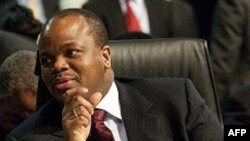WASHINGTON, DC —
The leader of Swaziland’s People’s United Democratic Movement (PUDEMO) has called on international election observers to boycott Friday’s vote.
“We are calling on countries not to respect the outcome of these elections and we want the international poll observers to boycott the election because no election shall be free in the absence of political parties,” said Mario Masuku.
Masuku called the election a charade and a mockery of democracy and an affront to Swazis. He said the balloting does not allow Swazis to freely choose their representatives in the southern African kingdom.
“These are not elections, they are just mere selections, because people are going [to parliament] on their so-called merit,” said Masuku.
He says members of his group are unlikely to participate in the vote.
“We are on a campaign right now to boycott the national election, to call for a true dialogue towards a national constitution that is truly democratic,” said Masuku.
Elections are held every five years in the nation where King Mswati III is the absolute monarch.
The government has not yet announced a date for the elections but some analysts say the balloting could be held between August and October. Political parties are banned in Swaziland, though the constitution allows freedom of association and assembly.
Following the 2008 vote, the Commonwealth election monitoring team, declared that the voting was flawed and urged Swaziland to rewrite its constitution, if the country wanted to “ensure that Swaziland’s commitment to political pluralism is unequivocal.”
The Commonwealth poll group issued a report saying “it is widely accepted internationally that democracy includes the right of individuals to associate with and support the political party of their choice… Yet in practice this right currently does not exist [in Swaziland].”
The government has repeatedly accused members of PUDEMO of plotting to destabilize the country, a charge the group denies.
Masuku says his group wants a national dialogue to chart a course for democracy with a credible government that has a mandate from the people.
“We are aware that we are dealing with an obstinate institution. They are not prepared to come for dialogue, but we will always call for it wherever we go and whoever we meet in the international community. PUDEMO is ready for a national dialogue for a peaceful democratic Swaziland,” said Masuku.
“We also know,” he continued, “that no dictator will be ready to discuss or hold dialogue [about] his going out of power. But we are saying violence is not the best way of transforming a country into a peaceful and democratic state.”
“We are calling on countries not to respect the outcome of these elections and we want the international poll observers to boycott the election because no election shall be free in the absence of political parties,” said Mario Masuku.
Masuku called the election a charade and a mockery of democracy and an affront to Swazis. He said the balloting does not allow Swazis to freely choose their representatives in the southern African kingdom.
“These are not elections, they are just mere selections, because people are going [to parliament] on their so-called merit,” said Masuku.
He says members of his group are unlikely to participate in the vote.
“We are on a campaign right now to boycott the national election, to call for a true dialogue towards a national constitution that is truly democratic,” said Masuku.
Elections are held every five years in the nation where King Mswati III is the absolute monarch.
The government has not yet announced a date for the elections but some analysts say the balloting could be held between August and October. Political parties are banned in Swaziland, though the constitution allows freedom of association and assembly.
Following the 2008 vote, the Commonwealth election monitoring team, declared that the voting was flawed and urged Swaziland to rewrite its constitution, if the country wanted to “ensure that Swaziland’s commitment to political pluralism is unequivocal.”
The Commonwealth poll group issued a report saying “it is widely accepted internationally that democracy includes the right of individuals to associate with and support the political party of their choice… Yet in practice this right currently does not exist [in Swaziland].”
The government has repeatedly accused members of PUDEMO of plotting to destabilize the country, a charge the group denies.
Masuku says his group wants a national dialogue to chart a course for democracy with a credible government that has a mandate from the people.
“We are aware that we are dealing with an obstinate institution. They are not prepared to come for dialogue, but we will always call for it wherever we go and whoever we meet in the international community. PUDEMO is ready for a national dialogue for a peaceful democratic Swaziland,” said Masuku.
“We also know,” he continued, “that no dictator will be ready to discuss or hold dialogue [about] his going out of power. But we are saying violence is not the best way of transforming a country into a peaceful and democratic state.”




